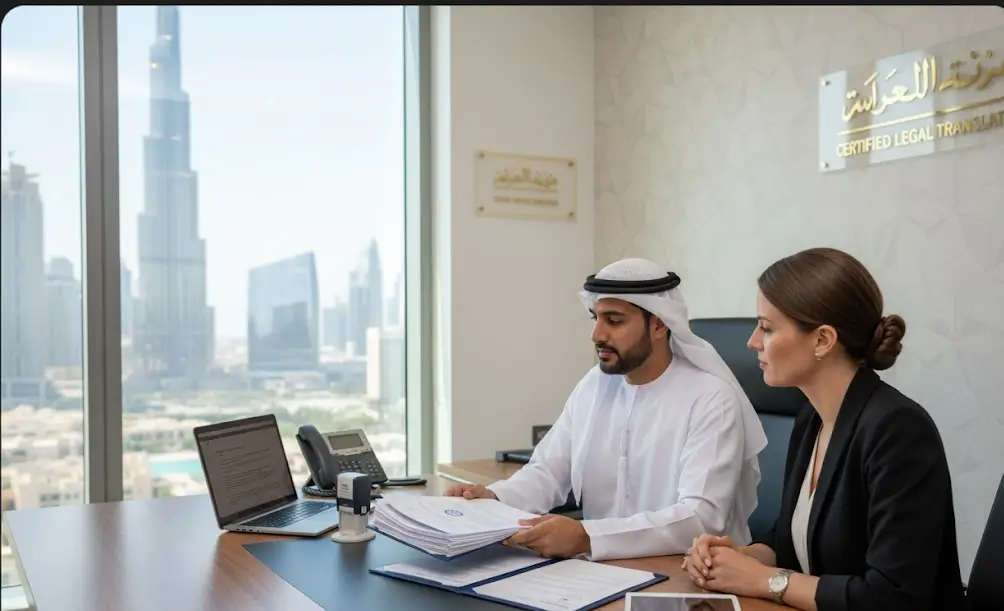
TLDR: in the UAE, most people say “sworn translation,” but what you usually need is a UAE Ministry of Justice certified legal translation. Mixing these up creates failed submissions, wasted fees, and missed deadlines. Here is the plain-English guide you can share with your team.
Key takeaways:
In many countries, a court or government “swears in” translators. The term stuck online, so people search for a sworn translator in Dubai. In the UAE, the legal system recognizes translators who are licensed and certified by the Ministry of Justice (MoJ). Day to day, “sworn” is used as a nickname for this status.
Outside legal filings, clients often ask for a certified translator in the UAE to provide a company-stamped, signed translation with a translator’s declaration.
This may be fine for internal use, websites, RFPs, or some overseas bodies. It is not the same as MoJ-certified legal translation.
If the document is going to a UAE court, a UAE government portal, or for visa, immigration, and company setup, assume you need MoJ-certified legal translation unless the receiving authority clearly says otherwise.

MoJ-certified legal translations are typically required by UAE courts and prosecutors, notary public offices and attestation desks, and most government portals handling immigration, family, and company records.
They are also commonly needed for police and public prosecution submissions, as well as many banking and compliance processes where official validation is mandatory.
Company-certified translations are often fine for marketing content, websites, and product documentation, along with internal policies, training materials, and manuals.
They may also be accepted for international tenders that only ask for a translator’s certificate, and by some foreign entities that do not require UAE legalization.
When in doubt, ask the receiving authority to name the exact requirement. If they say “legalized” or “for court” or “for MoI/ICP,” you are almost certainly in MoJ territory.
Choosing the wrong certification often triggers a reset at the counter or portal, adds reattestation and courier fees, pushes court dates and burns counsel time, and delays visas or licensing that can stall payroll or project starts. Small wording differences have big operational consequences.
Treat requirements like technical specifications, not preferences.
If you want a real‑world look at how court standards trip up filings, see our blog “Courtroom Chaos: Why Legal Translation in Dubai Is Failing Many Cases”.
Pricing varies with language pair, subject matter, and formatting complexity. Two certification paths are commonly quoted in the UAE, and they carry different effort and controls. As a rule of thumb:
Typical cost drivers:
Ask for a clear, itemised quote that separates translation, certification type, attestation/notarization, desktop publishing, and courier.
That way procurement can compare like for like and you only pay for what you actually need.
For MoJ-certified legal translation, send clear scans or original documents for review, then confirm the scope and quote, including any attestation or notarization.
An MoJ-licensed translator completes the work in the required language pair, the team performs editing and accuracy checks against the source, and the translation is issued on legal-translation letterhead with MoJ seals and stamps.
If needed, the agency can coordinate notarization, ministry attestations, or courier delivery.
For company-certified translation, share the files and usage context to confirm that MoJ certification is not required.
The text is translated and reviewed, a translator’s certificate of accuracy is issued on company letterhead, and delivery is provided as editable files and print-ready PDFs. Build in buffer time if the translation will feed into attestation or legalization steps.
A genuine sworn translator in Dubai will be able to show MoJ credentials. A reputable certified translator in the UAE will be transparent about where their certificate is accepted.
Court pleadings, evidence bundles, expert reports, and judgments almost always require MoJ-certified legal translation. Incomplete certification can get filings rejected on the spot.
Birth and marriage records, police clearances, divorce decrees, and custody documents should be MoJ-certified unless a specific foreign embassy directs otherwise.
Trade licenses, MoA and AoA, shareholder resolutions, audit reports, and regulatory forms typically need MoJ-certified translations. Vendor onboarding and general due diligence may accept company-certified translations, but always match the buyer’s checklist.
Degree certificates, transcripts, experience letters, and exam results for equivalency and licensing usually require MoJ-certified translation.
Catalogs, packaging, safety sheets, and websites are usually fine with company certification or no certification at all, as long as local regulations do not state otherwise for labels or safety data.
Vision Translation handles both certification paths with transparent, line‑item quotes so you can approve fast and avoid rework.
You get MoJ-licensed translators, company-certified options for commercial use, on-site support inside government centers for stamping and filing, end-to-end help with notarization, attestations and courier, plus AV and simultaneous interpreting gear for hearings and conferences.
Quotes separate translation, certification type (MoJ or company), optional notarization/attestation, desktop publishing, and courier/collection. Clear lines keep budgets clean and deadlines on track.

Book the right translation the first time. Whether you need a sworn translator in Dubai for a court filing or a certified translator in the UAE for a commercial tender, our team will confirm the requirement, quote clearly, and deliver on time.
